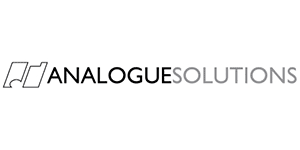
Analogue Solutions – британская компания, специализирующаяся на аналоговых синтезаторах, секвенсерах и эврорэковых модулях, которыми она 20 лет назад начала свое производство и сделала весомый вклад в популяризацию модульных синтезаторов.
Инструменты Analogue Solutions представляют собой ручную работу, все аспекты которой контролируются Томом Карпентером, все еще лично тестирующим экземпляры.
Синтезаторы бренда знамениты полностью аналоговым звуковым потоком, а также аналоговыми низкочастотными фильтрами и генераторами огибающей, то есть управление напряжением происходит без вмешательства центрального процессора, а напрямую, стоит только покрутить регулятор.
Процесс создания компании зародился еще в 1980-х, когда Том, только закончивший школу, купил Boss DR-110 и подержанный Roland SH-101, сконструировав около 6 моно синтов. Сменив несколько рабочих мест в музыкальных компаниях и производителях электроники, Карпентер занялся починкой синтезаторов, и первые собственные модуляры не заставили себя долго ждать – удобный вариант производства, как наиболее простого и дешевого в мире музыкальных инструментов. Во многом это объясняет современный взрыв количества выпускаемых модульных синтезаторов, чем занимаются около 200 компаний, не считая индивидуальных предпринимателей.
Том отдал предпочтение живому звуку, когда любовь к цифровой продукции уже охватила весь мир и, по его словам, переросла в музыкальную лень. Он пошел путем модернизации старых синтезаторов и драм машин, перекупкой которых занимался до этого, добавляя в них разные способы коммутации. Но технический склад ума, опыт работы с электроникой и серьезное вдохновение музыкой тех лет расковали его бизнес в нечто большее.
Как и многие начинающие изготовители синтезаторов, Карпентеру было важно, чтобы его инструменты могли звучать, как его любимые группы. Только лучше. Композиция “Black Celebration” Depeche Mode оказала на него неизгладимое впечатление, впрочем, как и Kraftwerk, и Erasure. Он понимал, что классические аналоговые аппараты способны произвести далеко не каждый звук, который ему нравился, поэтому сделал ставку на усложнение оригинальных моносинтов и того, что они могли предложить.
Идея Analogue Solutions заключается в том, чтобы оставить аналоговому синтезатору его причудливые дрейфующие шумы, возникающие на фоне физических процессов, уйдя от стремления к перфекционизму в настройке и практически пошаговой фильтрации, т.е. от тотального цифрового сканирования.
Забавно, что такие названия, как Red Square, Vostok, Tereshkova начали появляться в списке Тома случайно. Первый модуль был красным прямоугольником, в честь чего и был наречен Красной площадью, а затем уже был сделан выбор в пользу кириллического шрифта. Vostok возник из-за озера Восток в Антарктиде, где НАСА проводили эксперименты.
Синтезаторами Analogue Solutions, среди которых Nyborg, Telemark, Vostok, Polymath, Leipzig, а также секвенсерами (Oberkorn) пользовались многие музыканты: The Horrors, Sound of Science, Deadmau5, Nine Inch Nails, Nitzer Ebb, The Human League, продюсер Depeche Mode Ben Hilier и др.
Парафонический Polymath играет за счет 4 VCO, его мульти фильтр основан на Oberheim SEM, имеет режим полифонии и унисона, а также предварительно пропатчен лишь до той степени, до какой модуль еще можно назвать модулем, то есть минимально и лишь там, где это необходимо, с возможностью свести каждую предустановку на ноль.
В Polymath имеются такие дополнительные функции, как Detune, выравнивающий VC02 и обостряющий VC04, и пружинный ревербератор, мгновенно трансформирующий звук и не обязательно становящийся в конец очереди обработки сигнала. А еще Polymath гордится своей схемой, которая уносит его в ретро-звучание 1970-х.
Монофонический Telemark особенно пригоден для извлечения бас-звуков и создания электронной перкуссии. Довольно простая панельная выкладка подтверждает склонность Карпентера к идее контроля «одна функция на один регулятор». Telemark заставит помучиться разве что с патчингом в отличие от Nyborg 12, чей сложный саб осциллятор изначально достаточно накручен, чтобы издавать насыщенные звуки. Многие характеристики с другими модулями компании разделит и Leipzig-S, который позже был выпущен вместе с чувствительной полувзвешенной клавиатурой. Синтезатор не имеет памяти, поэтому каждый воспроизводимый на нем звук будет уникальным. Под названием Telemark-K с клавиатурой был выпущен и одноименный модуляр, во многом повторяющий свойства синтезаторов бренда Analogue Solutions.
Том Карпентер создал компанию для себя, вложив свои главные представления о том, как должны звучать настоящие аналоговые синтезаторы, во все инструменты, выпускаемые под маркой Analogue Solutions.










